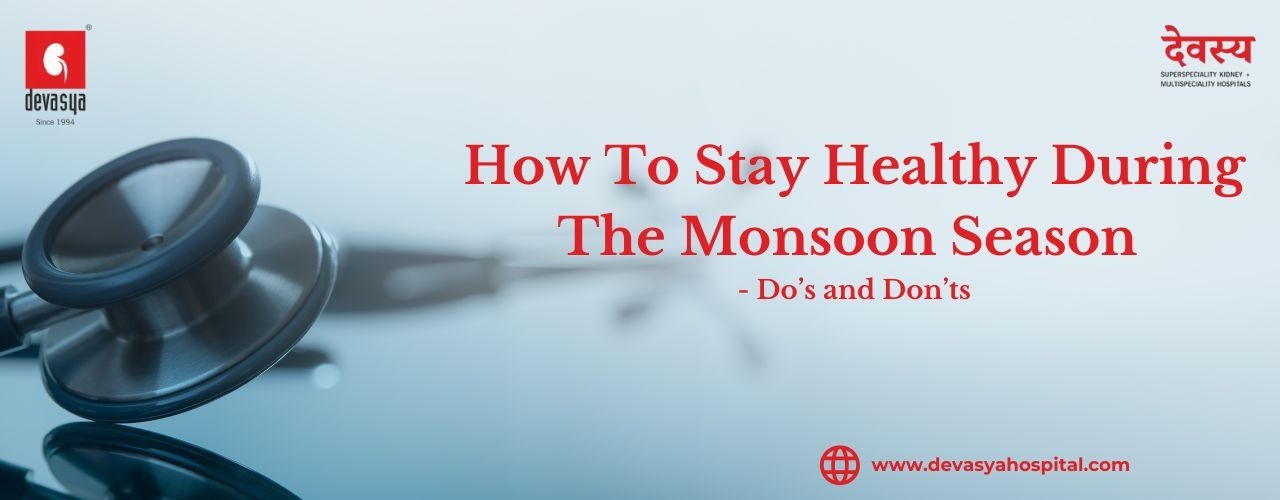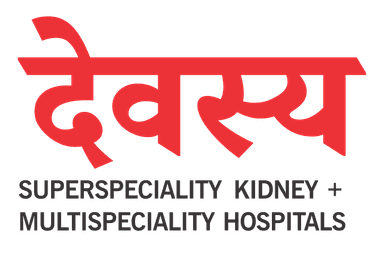How to Stay Healthy During the Monsoon Season: Do’s and Don’ts
Dr. Dinesh Patel
Monsoon health tips from Devasya Hospital – simple do’s & don’ts to prevent infections and stay safe this rainy season.

Worried about falling sick during the rainy season? This easy guide shares the top do’s and don’ts to help you stay healthy and infection-free during the monsoon. Get trusted tips from Devasya Hospital to keep you and your family safe.
The monsoon season - ah, what a relief it is after all that heat! But along with the Chai, Pakoras, and petrichor, the rainy season also brings its own set of health worries. It is a season of joy, but it is also a time that calls for a little extra care for our health and the well-being of our families. From colds and mosquito-borne diseases to stomach problems and skin infections, you need to be extra careful to stay healthy during the rainy season. At Devasya Hospital, we are not just about treating you when you are sick; we want to help you stay healthy and happy.
This blog will guide you with simple do’s and don’ts that anyone can follow, including kids and elders. Stay healthy and enjoy the monsoon with your loved ones.
First and Foremost - Why Is Monsoon Season a Health Risk for Everyone?
Have you ever thought why everyone gets a fever and a cold during the rainy season?
During the monsoon season the air becomes very humid and sticky, which makes it hard for your body to stay cool. Rainwater get collected everywhere in pots, drains, and roads. This stagnant water helps viruses, germs, and mosquitoes spread quickly. Closed spaces and damp clothes may also lead to fungal infections. Infections such as Cholera, Typhoid, and Diarrhoea often spread through contaminated food and water.
Children, pregnant women, elders, and anyone with low immunity may get sick more easily during this season. So, it is imperative to be extra cautious in the monsoon months.
Most Common Health Issues During Monsoon You Should Watch For
Knowing what to expect makes it easier to stay prepared. During the monsoon season, our hospitals see a rise in these illnesses.
- Flu and Common Cold
- Stomach infections
- Dengue and malaria
- Urinary Tract Infections (UTIs)
- Skin Infections and Fungal Issues
- Pregnancy-related infections(Due to hormonal changes and reduced immunity)
If you experience symptoms like high fever, vomiting, burning while urinating, or abdominal pain, consult a doctor immediately. Delaying can make things worse.
Monsoon Health Do’s: Smart Habits to Stay Safe and Strong
Here is what you and your family can do to protect your health in the rainy season.
-
Use soap and water to wash your hands regularly during the day. Always wash before eating, after using the toilet, and after touching dirty surfaces.
-
Avoid raw salads and street food. Eat only well-cooked, hot meals.
-
Include turmeric milk, citrus fruits, and vitamin-rich foods in meals.
-
Always drink boiled or purified water to avoid getting sick.
-
Choose breathable fabrics like cotton. Avoid damp clothes and wet socks, which can lead to fungal infections.
-
Open windows for fresh air when it is not raining. Install mosquito nets on the windows. Clear any still water near your house to prevent mosquito breeding.
-
Pregnant women and people with kidney or urinary problems should be extra careful about hygiene.
Stay safe and enjoy the rain by following these easy tips.
Monsoon Health Don’ts - What to Avoid to Stay Illness-Free
Now that you know what to do, here are a few not to do things during the rainy season.
- Say no to pani puri, sev puri, and other street-side delicacies. They play a big role in spreading waterborne illnesses.
- Always use a filter or boil water. Never drink water from unknown sources or containers that are not covered. Always check if the water is clean and safe.
- Keep checking your surroundings for standing water. Empty out planters, coolers, and any containers where water may collect to prevent mosquito breeding.
- Stay away from waterlogged roads and areas. This water is full of harmful bacteria that can cause skin problems and other diseases.
- Do not ignore small wounds or rashes. Clean, cover, and treat them early to prevent infection.
- Wet footwear can cause fungal infections on your feet. Always dry your shoes properly and wear clean socks.
- Use the toilet whenever you feel the urge. Holding urine for too long can lead to infections, especially during humid weather.
- Do not wait if you feel unwell with signs like fever, cough, or burning during urination. See a doctor quickly. Our specialists are ready to help.
Warning Signs That Need Emergency Medical Attention During Monsoon
While minor illnesses can often be managed with rest and home care, certain symptoms require immediate professional help. If you or a family member experiences any of the following, seek medical attention without delay.
- If you have a high fever that does not come down with medicine, go to the hospital right away. Watch out, especially if you feel weak along with pain and a headache.
- If you find it hard to breathe, have chest pain, or cough up blood, see a doctor immediately.
- If passing urine burns and you have a fever, this could be a serious infection that needs immediate treatment.
- Severe stomach pain with fever needs quick medical attention.
- If you suddenly get a skin rash along with fever, it could be dengue or another serious disease.
In such cases, do not wait. Devasya Hospital offers 24/7 emergency medical services, so you get the right care at the right time.
How Devasya Hospital Keeps You Safe This Monsoon
At Devasya Hospital, our patient-centric approach means your well-being is at the heart of everything we do. Our expert medical teams and state-of-the-art facility are fully prepared to cure all monsoon-related health issues with a holistic approach.
Our emergency medical services are available 24/7. If you feel sick during the monsoon, do not wait. Our doctors are here to handle everything from fever to major infections.
We are known as the best gynec hospital for women's health problems. During the monsoon, women may face more urinary infections and other health issues. Our doctors take special care of pregnant women and help them stay healthy during the rainy season.
Our urology department is one of the best urology hospital in india. We treat all kinds of urine problems, kidney infections, and other urinary issues that are common during the monsoon.
Final Takeaways - Monsoon Health in 5 Simple Steps
Do not have time to read it all? Here is the gist of all the vital things to remember this monsoon season.
- Drink only boiled or purified water.
- Eat fresh and hot home-cooked meals.
- Wash your hands often.
- Keep your home clean and dry.
- Use mosquito repellents.
- Change into dry clothes right away if you get wet.
- Do not ignore any ongoing health issues.
Stay Safe This Monsoon with Devasya Hospital
No matter how heavy the rains, your health should always come first. If you ever feel unwell or need expert advice, trust Devasya Hospital to care for you and your loved ones, rain or shine. Reach out to us today for checkups or emergencies and enjoy a safe, healthy monsoon!
FAQs: Your Monsoon Health Questions Answered
Why is it important to boil water during the monsoon?
Boiling water kills the germs that cause diseases like typhoid and cholera, which are more common during the rainy season.
Is it safe to eat leafy vegetables in the monsoon?
Only if you thoroughly wash the leafy vegetables and cook them well.
Can rainy weather affect pregnancy health?
Yes. Infections are more common during the monsoon. It is best to consult the best gynec hospital for checkups and personalized care.
Why are UTIs more common during the monsoon?
Wet clothes and increased moisture lead to bacterial growth. Always change wet clothes and practice good bathroom hygiene during the monsoon season.
When should I rush to the hospital during monsoon?
If you experience high fever, difficulty breathing, vomiting, rashes, or notice blood in stools/urine, reach out to emergency medical services immediately.


